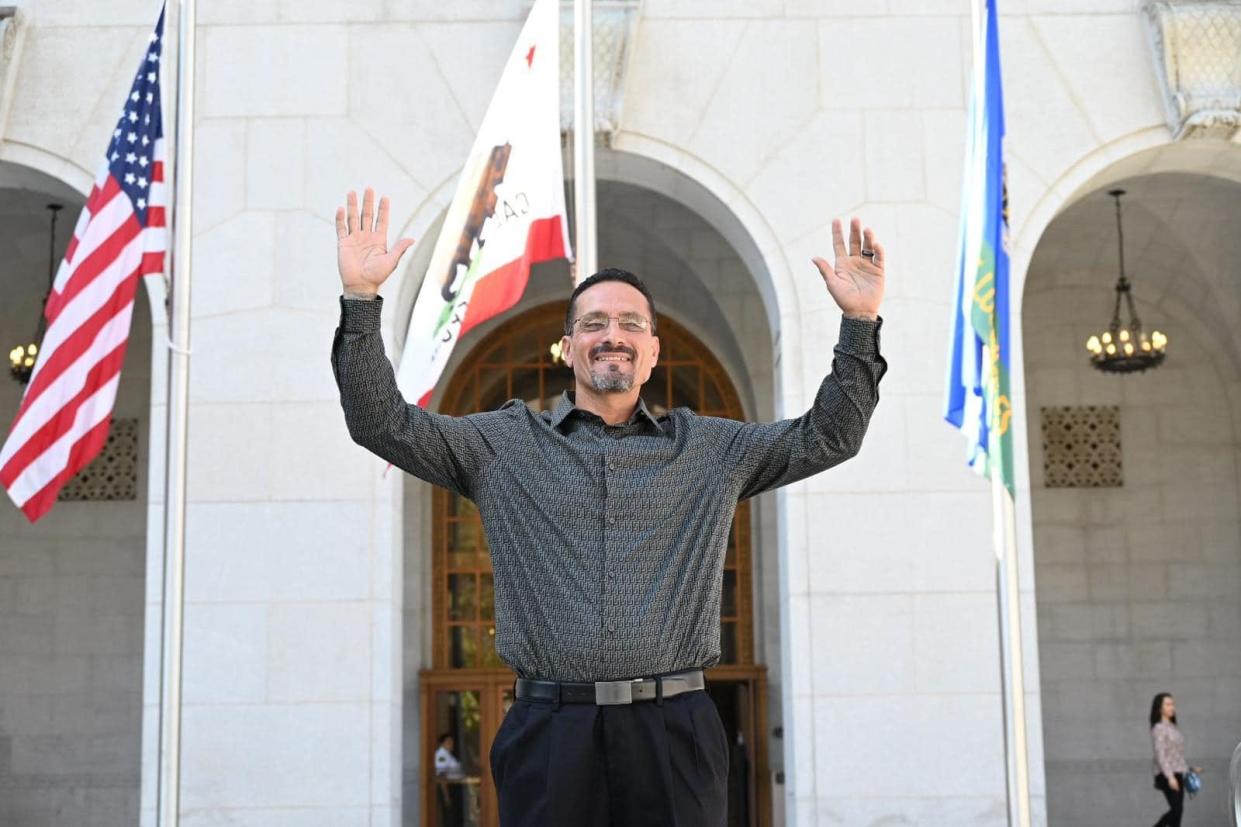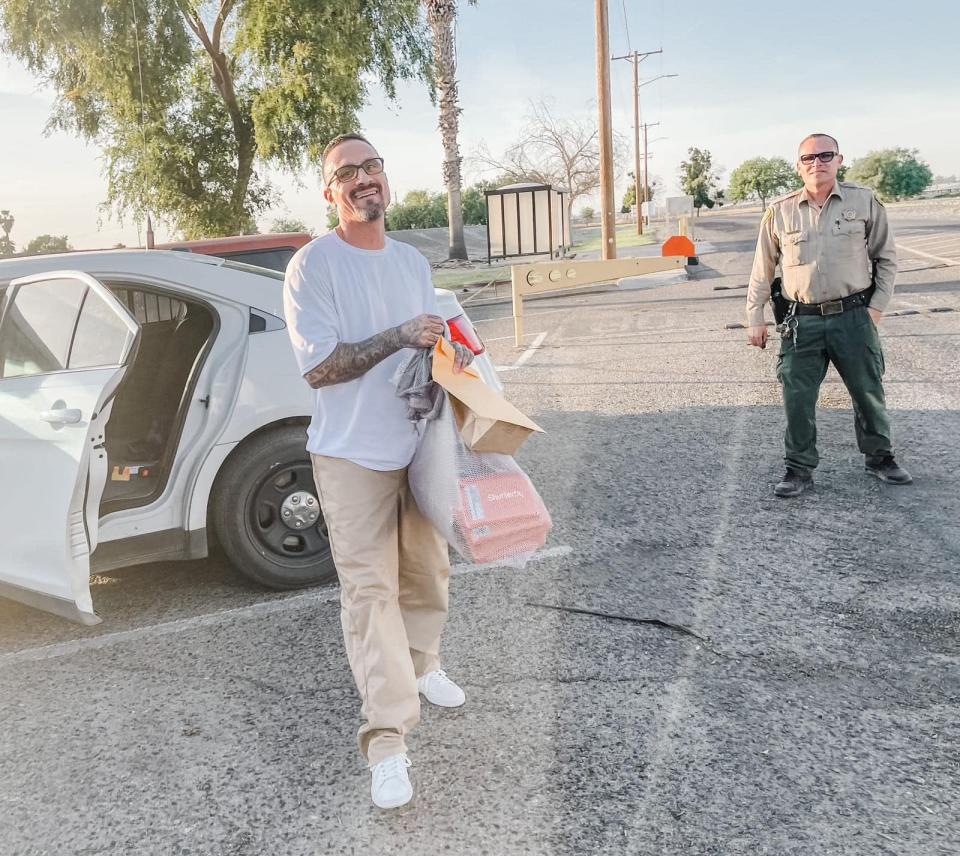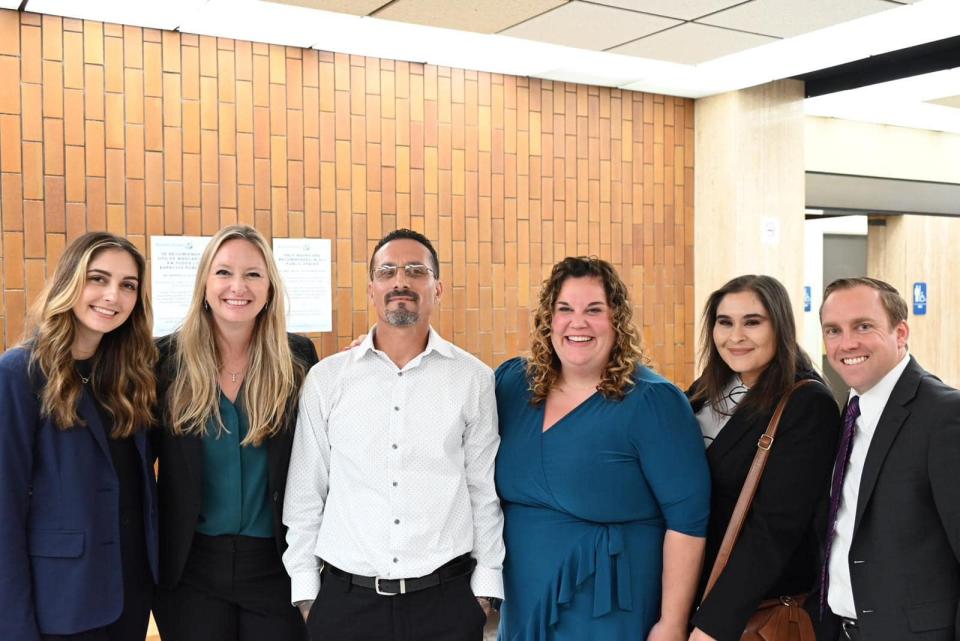'The truth has finally set him free.': Man released after serving 28 years for crime he didn't commit

A man who was sentence to life in prison at the age of 18 for a crime he didn't commit has been freed after serving 28 years.
Gerardo Cabanillas was convicted of robbery, kidnapping and sexual assault in 1995 based on what the California Innocence Project called in a post "bad eyewitness identifications, a false confession and police misconduct."
The California Innocence Project, a nonprofit that focuses on freeing wrongfully convicted people from prison, worked in tandem with the Los Angeles County District Attorney's Office to revisit the case and work towards an exoneration for Cabanillas, who had maintained his innocence throughout the criminal proceedings.
A statement by the California Innocence Project said the original conviction was made on questionable and problematic evidence, which was recently disproven by DNA findings.
Oregon man freed after 25 years: For 25 years a convicted killer in Oregon professed his innocence. Now he's a free man.
The crimes
In January of 1995, victims Raul F. and Maria A. were attacked by two armed men who robbed the pair, kidnapped Maria and sexually assaulted her. Two days later, an armed robber attempted to rob victims Ricardo S. and Maria L. and steal Ricardo's car.
Cabanillas was arrested on suspicion of committing the crimes a few days later, based on his "very generally" matching a description of one of the perpetrators, according to the innocence project.
The then 18-year-old was brought into an interrogation room where he repeatedly denied the accusations. Finally, however, after a seasoned detective told him he would be able to go home and only receive probation if he confessed to the crimes, Cabanillas relented.
Instead of going home, he was charged on fourteen felony counts including robbery, kidnapping, carjacking, rape, and sodomy.
Efforts targeting extremism fizzle out: Federal agencies promised to tackle extremism. Years later, experts see efforts sputtering out
Faulty evidence

It took two jury trials to convict Cabanillas, who testified on his own behalf and spoke to proclaim his innocence at both. He even presented an alibi, saying he was home with his family at the time of the crimes.
The evidence presented at trial was sparse, as police were unable to find any physical evidence connecting the teen to the crime. Instead, the prosecution presented the coerced confession and eyewitness identification, which is notorious for being unreliable.
Some of what was presented at trial was called even further into question due to the inconsistent and shaky accounts by the victims, who served as the identifying witnesses. Maria A. and Raul F. expressed serious doubts when trying to pick a suspect out of a lineup, and Maria at one point said she had never gotten a good enough look of the perpetrators to identify them in the first place.
Not only did Maria A. fail to identify Cabanillas at either trial, but Raul wavered heavily on his identification as well. According to the innocence project, however, police pushed the victims to point a finger at Cabanillas, even telling Maria A. and Raul F. that Cabanillas had confessed during the lineup process.
Regardless of questionable evidence, Cabanillas was eventually sentenced to life in prison.
Finally proven innocent

More than two decades passed before DNA evidence was able to definitively prove Cabanillas' innocence.
According to the innocence project, DNA left behind by Maria's attackers was collected in a rape kit at the time of the attacks. Finally equipped with the technology to run a DNA profile, evidence from the kit was tested and it was discovered that the sperm left on Maria matched two different men, neither of whom were Cabanillas.
An expert on false confessions was also brought on to review the case and found that Cabanillas' confession had a “high probability” of being false and consistent with police feeding him the desired information.
Armed with this new evidence, the California Innocence Project submitted a petition to the Superior Court for Cabanillas’s release in December of 2020. Finally, LA Superior Court Judge William C. Ryan reversed Cabanillas’s conviction this month.
Los Angeles County District Attorney George Gascón apologized for the miscarriage of justice in a press conference, saying in part, "Today, we acknowledge a grave injustice that has resulted in the unjust more than 28-year incarceration of Mr. Cabanillas. Upon thorough reexamination of the evidence and a comprehensive review of the case by my office’s Conviction Integrity Unit, it has become abundantly clear that a serious error was made."
The District Attorney, along with advocates, likewise called for reforms in the criminal justice system, which they acknowledged is not infallible.
“False confessions are one of the leading causes of wrongful convictions in the United States,” Alissa Bjerkhoel, Interim Director of the California Innocence Project at California Western School of Law said at the press conference.
“Police are permitted to lie to suspects, including promises of leniency if the person confesses. That is exactly what happened here and, if it was not for the DNA evidence, Gerardo would have spent the rest of his life in prison. We are thrilled for Gerardo and his family that the truth has finally set him free.”
This article originally appeared on USA TODAY: Man freed after serving 28 years in prison for wrongful conviction

